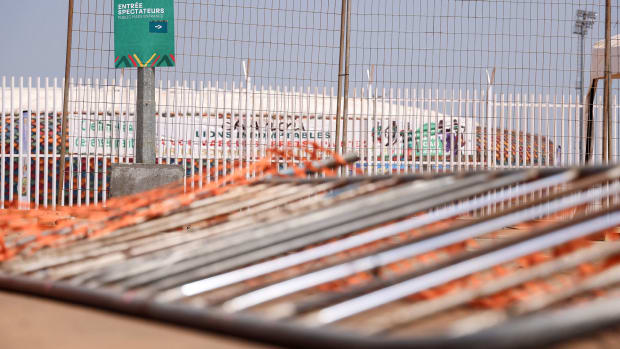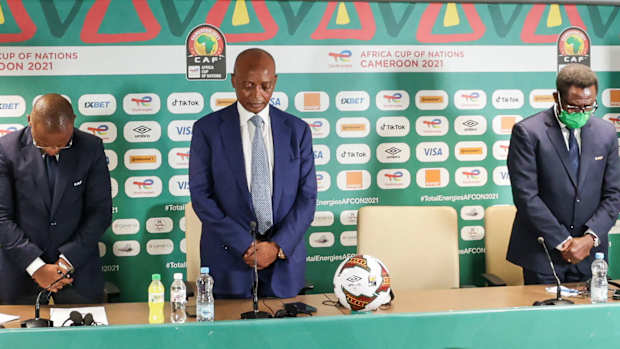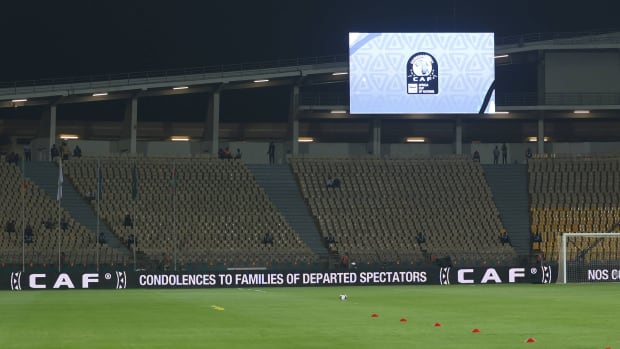A stampede outside a Cameroon knockout-stage match killed eight, leaving a permanent blight on the competition and plenty searching for answers.
YAOUNDÉ, Cameroon — In late November, the Confederation of African Football (CAF) threatened to take the Africa Cup of Nations away from the Stade Olembe, the new showpiece stadium in Yaoundé, unless “external works” were concluded within 10 days. Those works included an access road and a security fence. It appears that, inadvertently, those features caused the deaths of eight fans during Cameroon’s last-16 victory over Comoros on Monday night. Trapped by the fence, they were trampled to death on the road.
The Olembe lies in a suburb to the far north of Yaoundé, the Cameroonian capital. Most fans approach from the south and so make their way up a long avenue toward the South Stands. Tickets are not specific to any part of the ground. Having passed through COVID-19 testing tents and then security, there is a space of about 20 yards over the road to the security fence. There are three gates, but it seems that on Monday only the left-hand one was open.
A clean-up had taken place, but even on Tuesday afternoon, splinters of vuvuzelas, the bright red, yellow and green plastic incongruous against the dusty concrete, a discarded shoe and a discarded sandal and two broken pairs of sunglasses remained. A temporary barrier between the central gate and the left-hand one had been knocked down and still lay buckled over the curb.

Kenzo Tribouillard/AFP/Getty Images
Videos taken between 7:30 p.m. and 8 p.m. local time, when the game kicked off, show fans running toward the security tents and many climbing the fence. But it seems that in the minutes immediately after kickoff there was a surge, in which the eight were trampled to death. At least two of the dead were women and two children, one 14 and one a lot younger.
"Some of the people came just to be part of the atmosphere," CAF president Patrice Motsepe, said at a press conference. "Including those who didn't have tickets, so I think we do accept that thousands of people more than what was expected did arrive.
"I went to see where the people lost their lives and you see it's a gate. That gate was supposed to be open. Because if it was open, they would have walked through and it was closed for inexplicable reasons. If that gate was open as it was supposed to, we wouldn't have had this problem we have now, this loss of life.”

Sebastian Frej/Imago Images
After on-site triage victims were taken to the nearby Messassi hospital, a security guard there said that by 4 a.m. they had been dispersed to other hospitals around Yaoundé. Six were taken to the Centre des Urgences de Yaoundé (CURY). One of the medics there, Dr. Diana Bikele, said that all had shown signs of having been trampled.
By Tuesday afternoon, four had been released. One of the two that remained, a 20-year-old male who did not want his name revealed, had collapsed in the celebrations after Vincent Aboubakar put Cameroon 2–0 up. He said he had felt “a pressure on my chest” before losing consciousness. It was only after between 45 minutes and an hour that he came around in the stadium triage center before being moved to CURY. Francis, a salesman at a print company, was in the same south section of the ground and said it felt dangerously full, even though capacity is supposed to be capped at 80% because of COVID-19 protocols.
The other that remained at CURY, Saloman, had been involved in that initial crush.
“I went to support my team, the game had started there were many fans at the gate and they surged,” he said. “I fell down, just like that, and people trampled over me.”

Sebastian Frej/Imago Images
Exactly who is to blame is unclear, although Romaric, a fan who attended the game with his fiancé, said that he realized a crush was developing but followed police advice to walk around the ground to other gates.
“Policemen were telling everyone that other gates were open but many wanted to take the shortest route rather than go round,” he said. He suggested police were severely outnumbered.
Sunday’s quarterfinal at the Olembe has already been moved to the other stadium in Yaoundé, the Stade Ahmadou Ahidjo. It has a capacity of 42,000 and remains a little shabby despite its renovation in 2016, but for a game not involving the hosts that shouldn’t be a problem. Cameroon plays its quarterfinal in Douala, but if it wins that it remains to be seen whether the 60,000-capacity Olembe can be made safe. Motsepe has commissioned a committee to report back by Friday.
The tournament goes on—both Senegal-Cape Verde and Morocco-Malawi proceeded as scheduled on Tuesday—but the Olembe, supposed to be the jewel of the infrastructure spending it entailed, will now forever be remembered what happened on Monday night.
More Soccer Coverage: